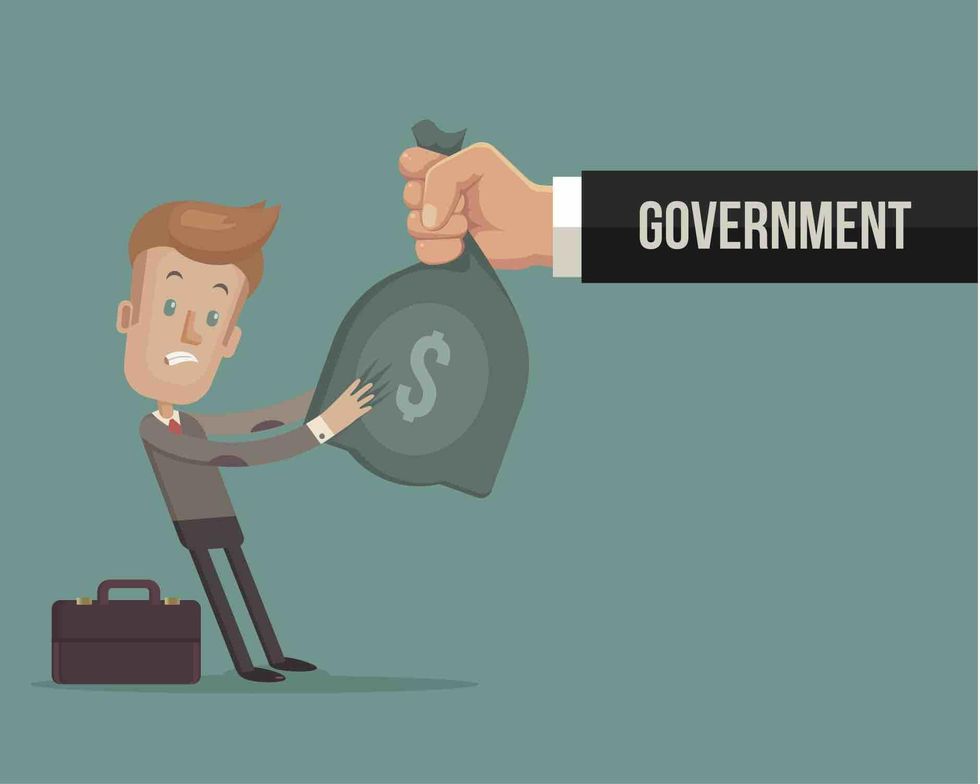
Lawmakers across the country, but especially in Washington, D.C., use taxes to take wealth from people who have rightfully earned it so they can give it to others who have done nothing to deserve it: bureaucrats. (PrettyVectors/Getty Images)

From the moment America was founded until today, taxation has been an important tool used by government to accomplish specific, necessary functions. Taxes are needed to provide for the common defense, ensure a system of justice exists (including judges and law enforcement officers), and to maintain a firm, well-established system of property rights.
However, over the past 100 years, taxes have become less like a government tool used to ensure justice is served and more comparable to a blunt weapon with which left-wing, socialistic politicians on both sides of the aisle can score political points, buy support from special-interest groups, and punish America’s job creators.
Lawmakers across the country, but especially in Washington, D.C., use taxes to take wealth from people who have rightfully earned it so they can give it to others who have done nothing to deserve it: bureaucrats. This isn’t just a foolish, irresponsible practice, it’s evil. People’s property — and money is a form of property — shouldn’t be seized from them under the guise of taxation unless it’s used for a legitimate and moral purpose.
That “moral purpose” is usually presented as “helping the poor,” but contrary to popular belief, hundreds of billions of the tax dollars taken from paychecks each year don’t go toward helping people; they are instead used to prop up the nation’s massive government agencies or to pay for frivolous government projects or services.
For instance, there are nearly 2.1 million civilian full-time equivalent workers in the federal government today (not including the Postal Service), and the average annual wage for these workers exceeded $88,800 in 2016. That’s about $20,000 more per year than what workers in the private sector earned on average. In total, taxpayers pay federal executive branch employees more than $276 billion every year.
Many of these government workers aren’t necessary for the core functions of the government to operate. In fact, by the federal government’s own admission, more than 800,000 are considered “nonessential,” accounting for 38 percent of the federal civilian workforce. If we assume only one-quarter of all federal civilian employees aren’t necessary for the government to operate effectively — and the real number is likely much higher than that — then taxpayers would save roughly $100 billion every year if government were to eliminate unnecessary jobs and pay government employees fair wages.
Government’s bloated size is just part of the problem. Billions of additional dollars are wasted on useless projects. In 2017, the federal Department of Transportation spent $1.04 billion to help San Diego expand its trolley service by 10.9 miles. The National Science Foundation paid $475,000 to create a digital database for studying a potential link between changes in indigenous languages in Mexico and the location of plants. In November, Business Insider reported the National Archives paid $100,000 to have 250 hours of movie footage from the 1970s digitized. And let’s not forget about the $15.2 million spent by Congress from 1997 to 2014 to settle sexual harassment claims.
Advocates of increasing taxes say they are necessary for helping the poor, but given all the waste, fraud, and abuse in government, how could that possibly be true?
The federal government is expected to take in $3.4 trillion in fiscal year 2019. If just one-quarter of these dollars were given directly to poor families instead of used to pay for government agencies, every family living below the federal poverty level in America (about 8.1 million) would receive $104,000 in cash — enough to pay for everything a family needs, including health insurance, car insurance, food, and housing.
Hundreds of billions of your tax dollars are spent every year in the name of helping those in need, but in reality, federal taxes are mostly used to please the Washington, D.C., elite. The ruling class in Congress knows this, and yet it takes and wastes your tax dollars freely and without remorse. In fact, many of them want to take even more of your money!
This isn’t just wasteful, reckless, and an example of poor government, it’s government-sanctioned theft, a truly immoral practice that has become so common, most Americans just accept it as a normal part of life.
The time has come to radically change course, but the only way that can occur is if power is taken away from Washington bureaucrats and given back to the states and local governments, where it’s much easier for citizens to manage government and where special-interest groups are far less impactful.
Until that occurs, government will never reform its dreadful practices, no matter how many elections are won by so-called “conservatives.”
Justin Haskins (Jhaskins@heartland.org) is executive editor and a research fellow at The Heartland Institute.
Justin Haskins